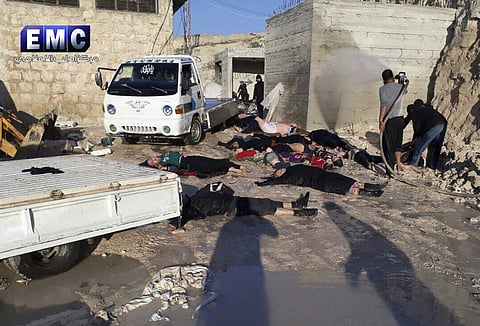

BEIRUT: United Nations investigators have said the Syrian regime is responsible for a sarin gas attack on a rebel-held Syrian town in April, a finding criticised by Moscow.
The UN puts the death toll for the strike on Khan Sheikhun at 83, while the UK-based Syrian Observatory for Human Rights says 87 died.
Here is a recap of what happened and developments since:
Convulsions, breathing problems
A strike hits Khan Sheikhun in Idlib province on April 4. Medical sources in the town report symptoms among the affected included fainting, vomiting and foaming at the mouth.
The Observatory says the dead were killed by a "toxic gas", although it is unable to confirm the nature of the substance.
Photographs circulated by activists showed members of the volunteer White Helmets rescue group using hoses to wash down the injured, as well as at least two men with white foam around their mouths.
The accusations
Syria's opposition accuses President Bashar al-Assad's regime of using munitions containing a toxic gas. The army categorically denies the charge.
A wave of international condemnation follows, with several governments accusing Assad of responsibility. The United States condemns the act as "reprehensible".
On April 5, Russia comes to the defence of its ally, saying Syrian jets had hit a "terrorist warehouse" near Khan Sheikhun that contained "toxic substances".
The World Health Organization says victims showed symptoms consistent with the use of a nerve agent, while humanitarian group Doctors Without Borders (MSF) speaks of sarin gas.
US missile barrage
Overnight on April 6-7, the US military fires 59 Tomahawk missiles from warships in the Mediterranean at the central Shayrat airbase, which it says was the launchpad for the alleged chemical attack.
The Syrian government describes the US strike as "foolish and irresponsible". Moscow calls the attack an "aggression against a sovereign state".
On April 10, a US military spokesman says the Pentagon believes the Syrian regime probably has additional chemical weapons stocked at the targeted airfield.
The following day, Pentagon chief Jim Mattis says Washington has "no doubt" that Assad's regime was behind the chemical attack.
Use of sarin 'incontrovertible'
Russia vetoes on April 13 a proposed Security Council resolution demanding that the Syrian government cooperate with an international investigation into claims that chemical weapons were used.
Assad tells AFP in an interview on April 13 that Western powers "fabricated" the attack to justify the US air strike.
The Organisation for the Prohibition of Chemical Weapons (OPCW) says on April 19 that "incontrovertible" test results showed sarin gas or a similar substance had been used.
'No doubt'
Citing intelligence services, then French foreign minister Jean-Marc Ayrault says on April 26: "There is no doubt about the responsibility of the Syrian regime given the way that the sarin used was produced."
In June, an OPCW fact-finding mission also concludes that sarin was used. Russia dismisses its report, saying the "findings are still based on rather questionable data".
In the first UN report to officially blame Damascus, UN war crimes investigators say in September they have an "extensive body of information" showing that the Syrian air force was behind the attack.
On October 24, Russia vetoes a US-drafted resolution that would have extended by a year an investigation of who is behind various chemical weapons attacks in Syria.
Two days later, a joint UN-OPCW panel also says it is confident the Syrian regime is responsible.
Russia criticises their report, saying it contains inconsistencies and unverified evidence.